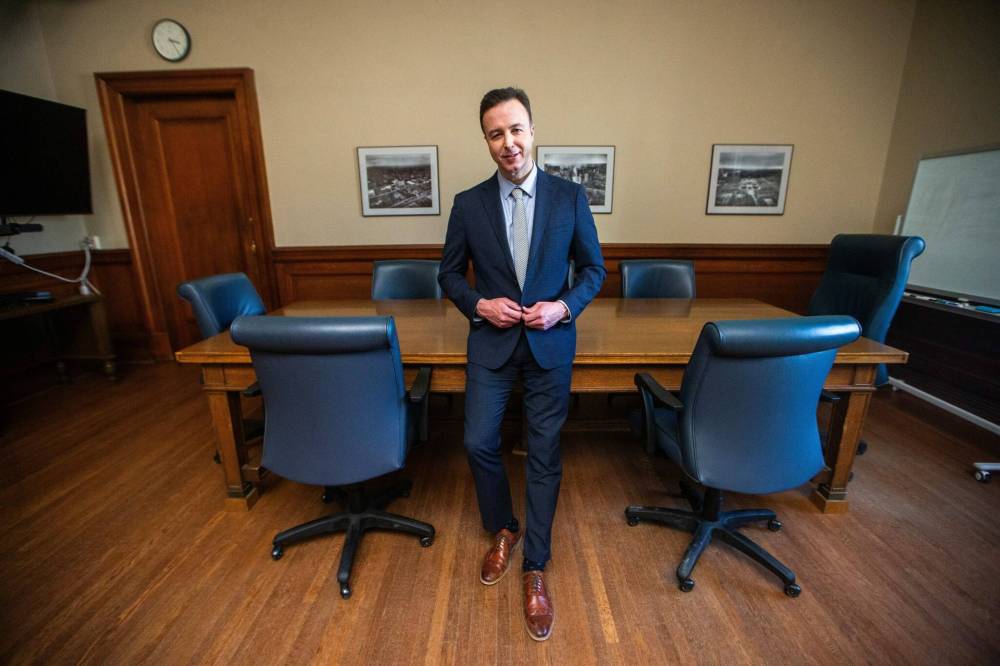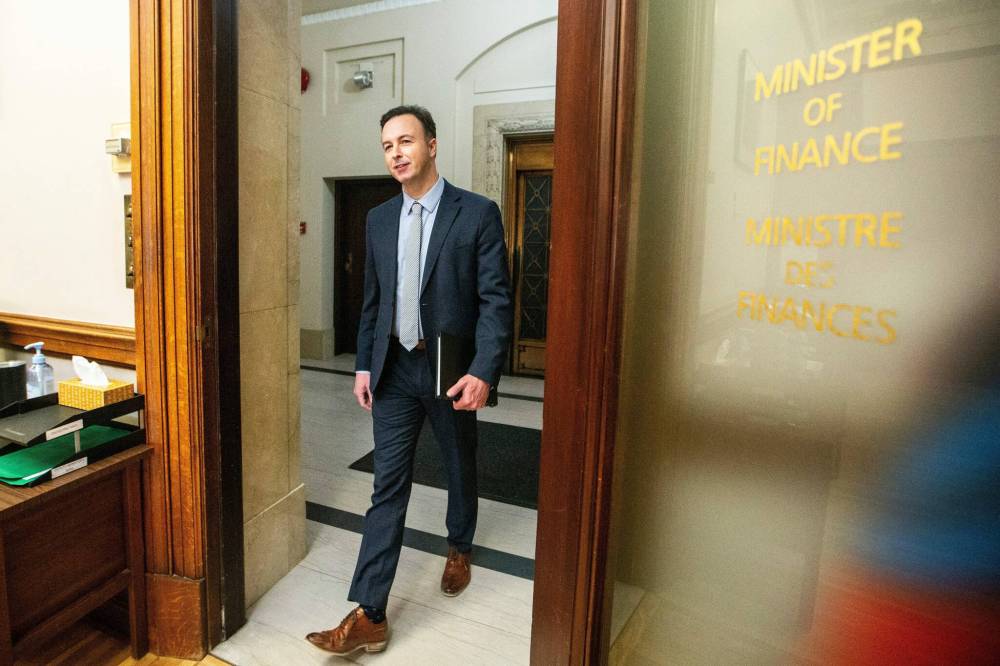Just six months into the job, Finance Minister Adrien Sala is poised to make Manitoba political history.
On Tuesday, Sala, 44, will become the only finance minister to table a budget while also boasting an album on Spotify.
Years before he heard the siren call of electoral politics, Sala was a well-regarded local singer-songwriter. He put out two albums, the second of which — Diamond in the Mind — was recorded in 2009 and is still present on most music streaming platforms.

What kind of music did Sala play? A review of the album by then Free Press music critic Melissa Martin described Sala as having a “fine, broke-down voice” that “quavers between shoe-gazing and whisky-shooting, like an emo singer after a three week bender down the Mississippi.”
“Every track on this (album),” Martin wrote, “is strung out, wrung out and down on its luck.”
When you consider the challenge facing Sala and the new NDP government — a $2-billion deficit, a crisis in health care and persistent high interest rates and inflation — perhaps that’s exactly the kind of finance minister the province needs right now: someone who knows what it’s like to be strung out, wrung out and a little down on his luck.
And Tuesday afternoon, Sala will get a chance to demonstrate not only his propensity for hurtin’ songs, but the personal and political skills he has employed to become, in a very short time, one of the opinion leaders in Premier Wab Kinew’s government.
Thompson born and Winnipeg raised, Sala has had a somewhat meteoric rise through the ranks of the NDP. First elected in 2019 in the St. James riding, he used his four years in opposition to craft a reputation as an effective critic who was not afraid to trade haymakers with the Progressive Conservative government.

But back in the early 2000s, Sala was pursuing music as a possible career path. After completing a Bachelor of Commerce degree in 2003, at the University of Manitoba’s Asper School of Business, Sala supported his music career by working at both the Broadway Neighbourhood Centre and Resource Assistance for Youth, social service agencies working on anti-gang programs and support for under-housed youth.
Music would continue to be a driving force in his life. Sala collaborated and recorded with some of the stalwarts of the Winnipeg roots music scene, including Jaxon Haldane and the D. Rangers, along with blues guitarist Romi Mayes, who provided background vocals on Sala’s albums. As well, Sala performed at the Winnipeg Folk Festival and has several songs in a series of retrospective compilations celebrating the best music performed at Winnipeg’s Times Change(d) High and Lonesome Club on Main Street, where he played regularly.
After a few years of writing, recording and performing, Sala said he started to realize that it was going to be very hard to make a living as a full-time musician. “It just became really clear that it was going to be a hard life to sustain. And so, yeah, I chose a different path.”
That path would take him back to school in 2013, this time for a master’s of science degree, specializing in the use of various information technologies to help vulnerable and homeless youth. During those studies, Sala worked for Manitoba Housing as an operations analyst. Following completion of this master’s degree, he moved to Assiniboine Credit Union, where he worked as director of strategy and operations.
“I think I’ve always had an interest in economics and finance. I just wasn’t interested in pursuing it right after I graduated.”– Adrien Sala
“I think I’ve always had an interest in economics and finance,” Sala said. “I just wasn’t interested in pursuing it right after I graduated.”
Brendan Reimer, an executive at ACU in charge of values-based banking, said he had worked with Sala both before and during his time at the credit union. He said Sala immediately impressed people at ACU with his broad base of knowledge and issues and, in particular, “finding out how things work.”
“Even going back to the work he did before (ACU), Adrien had a real curiosity about systems efficiency, about people and about how things work,” Reimer said.
How exactly did Sala find his way into party politics from a rewarding career with a progressive credit union? Like a lot of younger candidates, politics came looking for him.
“I didn’t have a plan to run. Some folks reached out to me and I was, at the time, becoming increasingly concerned with some of the decisions that were coming from the last Pallister government. It took a couple of weeks before we came around to the decision that it was something that I would pursue.”
The ‘we’ in that statement refers to wife Amelia Curran, an instructor in the criminal justice department at the University of Winnipeg. Sala said that along with Curran, he had to consider the impact that running would have on his two young children, daughters Nieve,10, and Ellie, 7. “You can’t do this work unless you have a supportive partner, especially with kids in the mix. It’s really thanks to Amelia that I was able to do this.”
Given the time between elections and the years of work it normally takes to establish a profile, politics isn’t a forum for overnight sensations. Yet, in just five years, Sala has come further, faster, than most of his peers.
How was he able to go from unknown quantity to arguably the second-most powerful minister in cabinet? You could fairly lay the blame at the feet of Paul Beauregard, with a big assist from former Tory premier Brian Pallister.
In 2020, less than a year after he was first elected, Sala obtained internal government communications through a freedom of information request that showed Beauregard, then secretary to Treasury Board and most-trusted adviser to Pallister, had been secretly meddling in the day-to-day management of Manitoba Hydro.
The correspondence showed Beauregard had intervened to stop a Hydro subsidiary from bidding on a $37-million contract to provide networking services to government offices. This raised the alarm bells, given the contract eventually went to Bell MTS, a company that had employed Beauregard prior to serving government.

Sala used question period to pick at the threads of Beauregard’s employment at Manitoba Telecom Services and BCE Bell Canada, the companies that would ultimately go on to form Bell MTS, and Pallister’s clumsy attempt to defend his senior mandarin.
As good as this story was, it was still a fairly arcane tale of insider politics. But just when it appeared the story would die out, something weird happened.
In December 2020, Sala revealed Beauregard had launched a complaint under the newly minted Respectful Workplace Policy, alleging he had been “harassed and bullied” by the NDP critic. Sala asked then-Speaker Myrna Driedger to determine whether his privileges as an MLA had been violated by the Pallister government’s use of the policy.
Beauregard issued a personal news release saying the review had found Sala guilty of violating the policy, but did not release the full report. That might have been a clear victory for the PC government but in a twist, Driedger issued a strong rebuke to Beauregard and Pallister for using the respectful workplace policy to gag opposition critics.
Following “bully-gate,” the political landscape changed. Beauregard would leave government for the private sector, Pallister was drummed out of his own party and Sala suddenly found himself a go-to voice from the NDP opposition.
Sala deliberately downplays the importance of this story, both to his own career and what would turn out to be the premature defeat of the Pallister government. However, he did admit that finding himself in the eye of a political hurricane was somewhat unnerving.
“The media interest that followed, I guess was surprising to me at some level, but you know, there was some pretty concerning interference we saw there,” Sala said. “So I thought it was important that we do that work. Because Manitobans needed to know about that.”
There is no way to know for sure whether a young politician is ready to take on the challenges of a portfolio such as Finance. There are no test drives and virtually no other job serves as a true precursor.
As a result, it’s far too early in his tenure as finance minister to figure out what kind of policy track he will occupy as the overseer of fiscal matters. The early returns show a high degree of synchronicity with Kinew and his clear intentions to move the NDP government to a very centrist slot on the provincial political spectrum.
Nothing demonstrates the NDP’s migration to the right more than Kinew’s decision to maintain all of the deep tax cuts introduced by the previous government — including bumps to the basic personal exemption and indexing of income tax brackets — while also offering Manitobans a six-month gas-tax holiday that, all told, will drain $160 million from the treasury.

The Kinew government’s tax policies have proven to be controversial, particularly among some core supporters and progressive third parties, such as the Canadian Centre for Policy Alternatives. All that means Sala will be on the hot seat Tuesday to not only defend these tax policies, but explain how the NDP plans to keep all of its campaign pledges — many of which involve huge growth in expenditures — while also giving away much-needed tax revenue.
Sala said the Tory tax expenditures are very much a “middle-class tax cut” that will benefit a lot of people. Adopting many of the talking points used by the previous government, Sala said the tax cuts will also make Manitoba more competitive with other jurisdictions when it comes to attracting skilled workers, and it will help ease the affordability strain that many Manitobans feel.
Still, does Sala think tax cuts that disproportionately help upper-income Manitobans are the right thing to do?
“The key thing here is ensuring that we do that in balance,” he said.
“And our upcoming budget, I think, will give us that opportunity to show how we’re ensuring that we deliver affordability improvements while we balance the books.”
dan.lett@winnipegfreepress.com

Dan Lett
Columnist
Born and raised in and around Toronto, Dan Lett came to Winnipeg in 1986, less than a year out of journalism school with a lifelong dream to be a newspaper reporter.